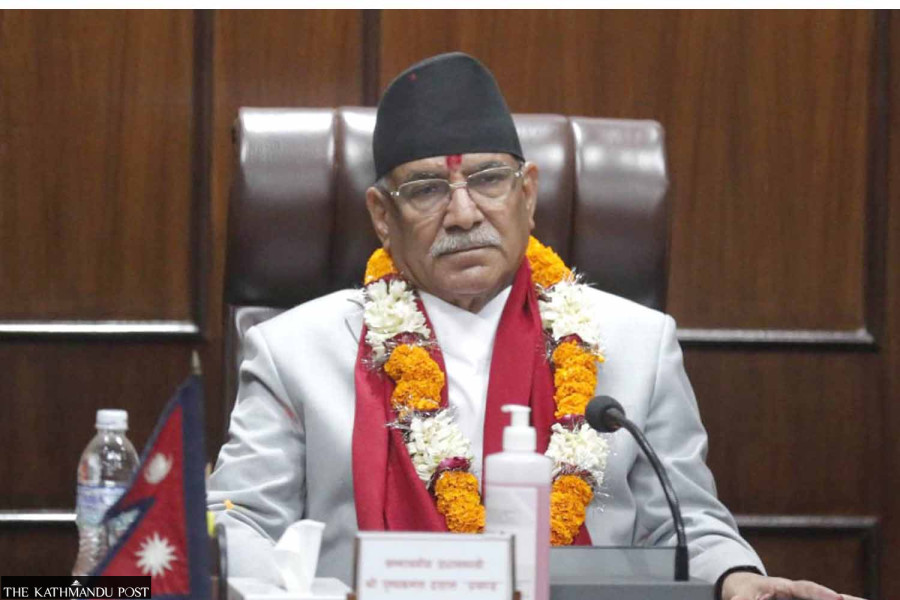National
Prime minister struggling to strike a power-sharing deal in coalition
Due to the delay in Cabinet expansion, four ministers are left without portfolios.
Tika R Pradhan
Prime Minister Pushpa Kamal Dahal is preparing to expand his Cabinet only after securing a vote of confidence in Parliament on January 10. But he is struggling to distribute ministerial posts given the composition of the ruling coalition.
While the coalition partners have yet to reach a clear understanding on power-sharing, the Janata Samajbadi Party, one of the partners, is still undecided on whether to join the government, and another partner the Rastriya Prajatantra Party (RPP) has set more than a dozen conditions for joining the Cabinet.
On top of that, ongoing ‘manoeuvrings’ by the chairman of the largest party backing the government, KP Sharma Oli, have added to the prime minister’s woes, leaders close to Dahal said.
“Prime Minister Dahal is not going to relent on every pressure tactic of the UML chair KP Sharma Oli,” said a politburo member of the CPN (Maoist Centre) close to Dahal. “He has also informed Oli that he won’t mind quitting anytime if he has to face undue pressures from the coalition partners.”
According to members of his personal secretariat, Prime Minister Dahal will expand his Cabinet and make all the necessary appointments only after securing a vote of confidence scheduled for January 10.
Due to the delay in Cabinet expansion, four ministers—Jwala Kumari Sah, Damodar Bhandari, Rajendra Rai and Abdul Khan, who already took the oath of office and secrecy along with the prime minister—are left without portfolios. Only the three deputy prime ministers—Bishnu Poudel of the UML, Narayan Kaji Shrestha from the Maoist Centre, and Rastriya Swatantra Party chair Rabi Lamichhane have got their portfolios—Finance, Physical Infrastructure and Transportation, and Home Affairs, respectively. So, the prime minister is expected to induct two more deputy prime ministers—one from the RPP and the other from the JSP, if senior leader Ashok Rai of the JSP joins the government.
The RPP’s work execution committee has recently decided to join the Dahal-led government only if its conditions are fulfilled. The party’s conditions include—declaration of Prithvi Jayanti a public holiday on Paush 27 [January 11], and allowing the Commission for Investigation of Abuse of Authority (CIAA) to investigate Cabinet’s decisions.
“We will start discussing portfolio allocations only after our conditions are met,” said Sagun Lawoti, a spokesperson for the RPP. “We have not even discussed whether to demand a deputy prime ministership or not.”
However, other leaders of the RPP claimed that the party won’t join the government unless it is accorded a deputy prime ministership and at least three ministries as party chair Rajendra Lingden has already told the party meeting that he would lead the party in the government.
With several partners making many demands, the prime minister is having a tough time allocating the ministerial portfolios.
Deputy General Secretary of the ruling CPN (Maoist Centre) Barshaman Pun has announced that the second-rung leaders of his party won’t join the government. With that decision, the Dahal-led Cabinet is likely to have leaders from younger generations, who would be easier for him to manage, but observers doubt whether such ministers could deliver results.
But at the same time, some senior leaders of both the Maoist Centre and the CPN-UML are reportedly unwilling to join the government arguing that a political novice like Rabi Lamichhane has landed a senior Cabinet position. If the second-rung leaders refused to join the government it could open an opportunity for Rekha Sharma, Sudan Kiranti, and Aman Lal Modi to become ministers, according to party insiders.
A member of Dahal’s personal secretariat said the prime minister was compelled to take an unpopular decision to bifurcate the existing ministries to increase three ministries to appease the parties supporting the government.
“The prime minister will try not to split the ministries even if he has to decrease the number of ministers from his party, but this won’t be a big problem if he can ensure service delivery,” said the Maoist politburo member. “Everyone knows Dahal is running the show in a very difficult time.”
Ashok Rai, who heads the JSP’s federal council, said his party has not yet taken any decision about joining the government, so it has not discussed ministerial portfolios. Rai, according to party insiders, is not happy with the election of Ram Sahay Prasad Yadav as the JSP’s Parliamentary Party leader.
Currently, Dahal has the support of the CPN-UML (79 seats with one independent who joined the party on Tuesday), Maoist Centre (32 seats), Rastriya Swatantra Party (20), RPP (14), JSP (12), Janamat Party (6) and Nagarik Unmukti Party (4 including one independent) besides two independent lawmakers—Prabhu Sah, who has recently registered Aam Janata Party, and Amresh Kumar Singh.
According to leaders privy to the development, possible ministries that could be bifurcated include the Ministry of Energy, Water Resources and Irrigation; Industry, Commerce and Supplies; Land Management, Cooperatives and Poverty Alleviation; Youth and Sports; Education, Science and Technology; and Physical Infrastructure and Transportation.
With the division of three ministries, the total number of ministries will reach 24 from the existing 21 besides the Office of the Prime Minister and Council of Ministers.




 18.12°C Kathmandu
18.12°C Kathmandu














